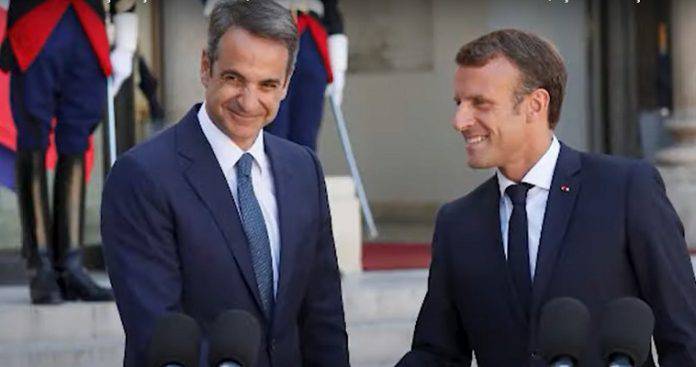Alexandros Tarkas: French-Greek alliance in the works – German pressure and the missed opportunity with the USA
11/09/2020
Greece and France are moving forward, in the official terminology, “Establishing a Strategic Partnership in Defense and Security”, following lengthy negotiations to prioritize its legal force (transnational agreement, official announcement, or simple declaration of intent) and aspects of the mutual military assistance clause.
Although the new agreement is essentially based on the June 6, 2008 joint declaration of then-President Nicolas Sarkozy and Prime Minister Costas Karamanlis, the government took too long to complete its upgrade. Kyriakos Mitsotakis had given assurances to Emmanuel Macron about a quick signature, during his visit to Paris on January 29, 2020.
Kyriakos Mitsotakis reportedly spoke about the need to resolve just certain details that would take a few weeks. The few weeks turned into five months until June, when the planned signing of the agreement was postponed at the last minute, mainly due to German pressure against the simultaneous supply of the French Belharra frigates.
Another three months have passed since then and there have been tensions in contacts with the French ambassador to Athens Patrick Maisonnave. Even now, no progress could have been made without the culmination of Turkish aggression. Contrary to the conspiracy theories common in Greece that the postponement of procuring the Belharra was the result of American pressure, the proven fact is that Germany was the one that moved actively, as early as last September.
Germany blocks through Eurogroup
Among other moves, Berlin sought to block, through the Eurogroup, the use of Greek bond profits for defense and armaments purposes. In this way it caused a major problem in Athens and Paris in financing the frigate contract.
The German moves in the Eurogroup are a blow to the overall fundraising efforts to strengthen national defense in many areas. The government is not without responsibilities, as it could overcome the Eurogroup’s reef by setting up a special infrastructure development fund, which would then finance defense needs from its own resources.
For their part, the US is clearly not excited about the prospect of a long-term involvement of France in Greek armaments. However, Washington attaches little importance to individual armaments programs, as it opposes mainly the support offered by the Greek Prime Minister to Macron’s proposals for European defense structures.
The specific position of Kyriakos Mitsotakis was made in 2018, when he was still the leader of the official opposition and independently of the Belharra frigates, or the Rafale fighters. The SYRIZA government was also in favor of Macron’s proposals, with the result that, in the first round of the Greece-US Strategic Dialogue, an American official told a Greek minister that “if you mean it, then we will have another discussion.”
Mistakes with the Greek-American agreement
At the same time, the current hours of tension in the Aegean and the Mediterranean reveal mistakes and omissions of the government in terms of defense cooperation with the United States. The Prime Minister, the Minister of Foreign Affairs Nikos Dendias and the Minister of National Defense Nikos Panagiotopoulos rightly moved, from the first weeks of their term, in favor of the rapid renewal of the Mutual Defense Cooperation Agreement (MDCA) with the US.
The mistake, however, was that they preferred to sign only one new annex to the older Greek-American military agreement (MDCA) of 1990, rather than negotiating a widely revised agreement that would provide defense equipment and clear US guarantees of Greece’s national security.
The government considered that there was comfort in time for a broader agreement in the future, despite the omens of stormy developments with Turkey. Surprisingly, there was no demand for large sums of money, not even when an associate of US Ambassador Jeffrey Payatt voluntarily sounded the Greeks out (since it was reasonable to expect Greek requests) during the preliminary discussions for the MDCA annex.
In addition to the US and France, questions are being raised about Germany’s stance on defense relations with Greece and its involvement in new armaments program. Athens proposes the establishment of a Strategic Dialogue (similar to the US) and maintains vague hopes for German capital investments in the Greek defense industry.
Instead, it would be more useful for the government to raise the issue of banning the export of material from Berlin to Ankara, as defined by German law (a traditional US practice, with no export licenses). It is doubtful, however, whether the Greek government will make raise this issue.





